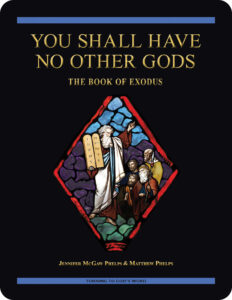 You Shall Have No Other Gods:
You Shall Have No Other Gods:
The Book of Exodus
Lesson 24 The Golden Calf
the book of Exodus 32:1–35
Revised Standard Version Catholic Edition (RSVCE)*
New American Bible Revised Edition (NABRE)*
Catechism of the Catholic Church
ex libris (in our library)
glossary for the book of Exodus
cross references in the book of Exodus
next lesson: Despite the People’s Sin, the LORD Renews His Covenant
This material coordinates with Lesson 24 on pages 118–122 in the study book You Shall Have No Other Gods: The Book of Exodus.
And God spoke all these words, saying, ‘I am the LORD your God, who brought you out of the land of Egypt, out of the house of bondage. You shall have no other gods before me. You shall not make for yourself a graven image, or any likeness of anything that is in heaven above, or that is in the earth beneath, or that is in the water under the earth; you shall not bow down to them or serve them; for I the LORD your God am a jealous God, visiting the iniquity of the fathers upon the children to the third and the fourth generation of those who hate me, but showing mercy to thousands of those who love me and keep my commandments.”—the book of Exodus 20:1–6
welcome to our in-depth study of the book of Exodus
We invite interested groups and individuals to check out the sample first lesson from this 28- lesson Turning to
lesson Turning to  God’s Word Catholic Bible study. These online study pages link to our free lesson video overviews, as well as to a glossary and cross references in the biblical text. Other study aids include maps, additional commentary, and prayers based on the primary Scripture in each lesson. You Shall Have No Other Gods: The Book of Exodus has been granted an imprimatur and can be purchased from our website shop. If you have a Bible-study question or comment, click on one of the “ask us your question” or “what do you think” buttons on any online study page.
God’s Word Catholic Bible study. These online study pages link to our free lesson video overviews, as well as to a glossary and cross references in the biblical text. Other study aids include maps, additional commentary, and prayers based on the primary Scripture in each lesson. You Shall Have No Other Gods: The Book of Exodus has been granted an imprimatur and can be purchased from our website shop. If you have a Bible-study question or comment, click on one of the “ask us your question” or “what do you think” buttons on any online study page.
open with prayer
It’s always wise to begin any Bible study with prayer, whether reading the Scriptures alone or meeting with others in a discussion group. You can pray using your own words or use one of the opening prayers on our website. We especially like the following:
Lord Jesus, you promised to send your Holy Spirit to teach us all things.
As we read and study your word today,
allow it to touch our hearts and change our lives. Amen.
let’s review—the book of Exodus 30:1—31:18
In Lesson 23 Worship Instructions; God Chooses His Artisans, the LORD provides Moses with more detail about how the various objects connected with worship should be made. These include the altar of incense with its horns, which once a year are to be bloodied in atonement. The LORD also issues instructions for a ransom to be paid by all of the sons of Israel. The money, to be used for expenses connected to worship in the tent of meeting, appears not to be a voluntary contribution. This ransom seems to be able to to make some atonement for sin for the person who pays it, and each person is required to pay the same amount—half a shekel. Also described in detail are the bronze laver, which foreshadows holy water fonts still found in present-day Catholic churches, and a recipe for holy incense. This incense is only to be used for liturgical purposes. God names the artisans that he’s chosen to create these holy things—Bezalel and Oholiab, of the tribes of Judah and Dan, respectively, and God makes the unusual claim that he’s filled Bezalel with the Holy Spirit specifically so that Bezalel will be qualified to create these things. The LORD also reiterates the importance of keeping the sabbath.
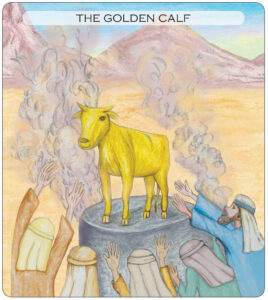 the golden calf
the golden calf
Most Catholics are familiar with the story of the people’s sin involving the golden calf. Possibly the most important things to be aware of in this story are Aaron’s complicity in creating this idol, and that it has nothing to do with the kind of worship the LORD is describing to Moses on the mountain. It’s significant that the offerings tied to the feast that Aaron is involved with are burnt offerings and peace offerings but not sin offerings. The primary purpose of the golden calf appears to be as an excuse for the people to throw a party in the guise of a religious festival. Click on the illustration (right) to enlarge it. The original illustration is on page 121 in You Shall Have No Other Gods: The Book of Exodus.
 what’s going on with Aaron? (58:14)
what’s going on with Aaron? (58:14)
In the video for this lesson, Turning to God’s Word author Matthew Phelps  addresses Aaron’s participation in the incident with the golden calf. Aaron doesn’t seem to care what alleged deity he serves as long as he gets to be in charge. He easily accepts priestly functions to serve a false God. Why would he do that? Aaron has no relationship with the God of his ancestors, who also is the God with whom his brother Moses has established a close relationship. Aaron appears to have confused what’s important, putting the act of service above the one who is being served. He’s putting
addresses Aaron’s participation in the incident with the golden calf. Aaron doesn’t seem to care what alleged deity he serves as long as he gets to be in charge. He easily accepts priestly functions to serve a false God. Why would he do that? Aaron has no relationship with the God of his ancestors, who also is the God with whom his brother Moses has established a close relationship. Aaron appears to have confused what’s important, putting the act of service above the one who is being served. He’s putting  the people and what they want ahead of God as well, while Moses—even in his intercession for the people—is doing so in terms of how he thinks it will affect God if all the people die.
the people and what they want ahead of God as well, while Moses—even in his intercession for the people—is doing so in terms of how he thinks it will affect God if all the people die.
The Scripture ranges for the videos that accompany this Catholic Bible study from Turning to God’s Word match the Scripture ranges for the sets of questions in You Shall Have No Other Gods: The Book of Exodus. You can follow along as Turning to God’s Word author Matthew Phelps discusses Lesson 24, “The Golden Calf,” on pages 118–122 in the study book.
what does it mean when the people rose up to play
Although scholars are divided about exactly what’s being indicated in the book of Exodus 32:6, which describes the people rising up to play, it seems clear that sin is involved in everything associated with the golden calf. The worst sin, of course, is the sin of idolatry, contrary to the first commandment. When Moses fails to return from the mountain where he’s gone to meet God, the people put their own desires ahead of the covenant that they’ve just entered into with the LORD. While few present-day Christians worship carved wood or molten idols, it’s worth asking what we might be putting ahead of our relationship with God. What are some things in the world that might be tempting men and women to ignore God—or at least to put off making time and space for the LORD?
biblical vocabulary—anthropomorphism
The word anthropomorphism refers to the tendency of men and women to give God human characteristics. This is what’s going on in the book of Exodus 32:7–10, which describes the LORD’s attempt to distance himself from the descendants of Jacob by describing them as the people that Moses brought out of Egypt. It’s the LORD, however, who brought the people out of Egypt, not Moses. God also is viewed as wanting to let his anger burn hot against the people. In reality, men and women have no idea whether the LORD experiences the same emotions as humans. Describing God’s anger, however, does much to explain the LORD’s reaction to the golden calf incident.
what Matthew says—Moses has begun to resemble the LORD
 When Moses first learns from the LORD about the people’s behavior, he attempts
When Moses first learns from the LORD about the people’s behavior, he attempts  to dissuade God from taking out his anger against the Israelites. This includes ignoring the LORD’s offer to make of him a great nation, a detail that frequently is overlooked in the retelling of events surrounding the golden calf incident. In the video overview for this lesson Turning to God’s Word author Matthew Phelps notes that when Moses actually sees for himself what God already has seen, Moses reacts in the same way. The book of Exodus 32:19 describes Moses’ own anger burning hot.
to dissuade God from taking out his anger against the Israelites. This includes ignoring the LORD’s offer to make of him a great nation, a detail that frequently is overlooked in the retelling of events surrounding the golden calf incident. In the video overview for this lesson Turning to God’s Word author Matthew Phelps notes that when Moses actually sees for himself what God already has seen, Moses reacts in the same way. The book of Exodus 32:19 describes Moses’ own anger burning hot.
ex libris—some additional insight about Moses’ pleas to the LORD
In the section about stories of prophets in the Pentateuch in Introduction to the Prophets: Their Stories, Sayings, and Scrolls, Thomas L. Leclerc, M.S. (Missionaries of La Salette), a priest and an associate  professor of sacred Scripture
professor of sacred Scripture 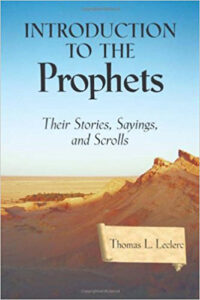 at Emmanuel College in Boston, Massachusetts, discusses three different strategies employed by Moses in prophetic intercession described in the thirtieth chapter of the book of Exodus. Leclerc’s book contains numerous charts and illustrations, as well as commentary on prophetic biblical passages that occur in Jewish, Protestant, and Roman Catholic lectionaries. Read excerpts and learn more about Introduction to the Prophets: Their Stories, Sayings, and Scrolls and other works related to Bible study at ex libris—main bookshelf.
at Emmanuel College in Boston, Massachusetts, discusses three different strategies employed by Moses in prophetic intercession described in the thirtieth chapter of the book of Exodus. Leclerc’s book contains numerous charts and illustrations, as well as commentary on prophetic biblical passages that occur in Jewish, Protestant, and Roman Catholic lectionaries. Read excerpts and learn more about Introduction to the Prophets: Their Stories, Sayings, and Scrolls and other works related to Bible study at ex libris—main bookshelf.
“[1] Crying out/prayer. Moses’ first attempt is to ‘implore the LORD,’ that is, to pray that  God listen to him. (In other stories of prophetic intercession, there are two variations of praying: falling down or prostrating before God, and offering incense.)
God listen to him. (In other stories of prophetic intercession, there are two variations of praying: falling down or prostrating before God, and offering incense.)
[2) Moral blackmail. Somewhat shamelessly, Moses in effect asks, ‘What will the neighbors think?’ He argues that the Egyptians will think badly of  a God who delivers his people only to destroy them himself. Moses argues, ‘For the sake of your own good reputation, don’t harm your people.’
a God who delivers his people only to destroy them himself. Moses argues, ‘For the sake of your own good reputation, don’t harm your people.’
[3] Moral pressure. Moses challenges God to remember the oath he had sworn to Abraham, Isaac, and Jacob. Surely God keeps promises. Surely God must be trustworthy. God cannot expect the people to keep their promise of loyalty if God does not keep his oaths to them.”
repentance—you could look it up in our archives
 In the book of Exodus 32:12, Moses urges the LORD to repent of the wrath God intends for the descendants of Jacob. You can learn more about the word “repentance” and how it comes into play in the New Covenant in regard to forgiveness of sins by reading Lost in Translation, an online column in which Turning to God’s Word author Matthew Phelps helps readers connect with ideas expressed in the original languages of the Scriptures. New Lost in Translation entries are posted on Mondays, and past entries are archived on our website. Contact us if you’d like to receive Lost in Translation by email every week.
In the book of Exodus 32:12, Moses urges the LORD to repent of the wrath God intends for the descendants of Jacob. You can learn more about the word “repentance” and how it comes into play in the New Covenant in regard to forgiveness of sins by reading Lost in Translation, an online column in which Turning to God’s Word author Matthew Phelps helps readers connect with ideas expressed in the original languages of the Scriptures. New Lost in Translation entries are posted on Mondays, and past entries are archived on our website. Contact us if you’d like to receive Lost in Translation by email every week.
service to God has a violent beginning
The book of Exodus 32:25–29 describes how members of the tribe of Levi go through the camp slaying other descendants of Jacob guilty of idolatrous worship of the golden calf. A couple of details are important here. One is that the Levites are of the same tribe as Moses, and their sudden willingness to slay members of other tribes may have more to do with their loyalty to Moses than any concern about the people’s failure to follow the LORD’s commandments. Another thing to keep in mind is that the Levites are descended from Levi, who in the thirty-fourth chapter in the book of Genesis, joins with his brother Simeon in exacting revenge against the men of Shechem for the rape of their sister Dinah.  Their rash behavior isn’t endorsed by their father Jacob, nor does the LORD appear to approve. You can learn more about Levi and Simeon in Lesson 20 The Story of Dinah in the Turning to God’s Word Catholic Bible study In the Beginning: The Book of Genesis.
Their rash behavior isn’t endorsed by their father Jacob, nor does the LORD appear to approve. You can learn more about Levi and Simeon in Lesson 20 The Story of Dinah in the Turning to God’s Word Catholic Bible study In the Beginning: The Book of Genesis.
what’s happening to the tribes in the future?
After the death of Solomon, David’s united kingdom will be torn into two parts. The southern kingdom of Judah will encompass territory settled by the tribes of Judah and Benjamin. The northern kingdom of 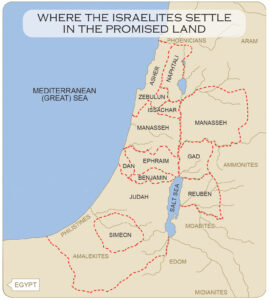 Israel will be made up of territory occupied by the remaining descendants of Jacob. These include the tribes of Reuben, Dan, Naphtali, Gad, Asher, Issachar, and Zebulun, the two half-tribes of Ephraim and Manasseh, who were the Egyptian-born sons of Joseph, and possibly remnants of the tribe of Simeon. Because some members of the tribe of Levi are consecrated to serve as priests, their descendants will live in both the northern and the southern kingdoms. It’s thought that some members of the tribe of Simeon eventually will be absorbed by the tribe of Judah while others drift north to intermingle with other tribes and become part of the northern kingdom. When the Assyrians conquer Israel in 722–721 B.C, the inhabitants of the former northern kingdom are relocated and foreigners brought in to resettle the area. When the southern kingdom of Judah falls in 587–586 B.C, many of the inhabitants of Judah are deported to Babylon. To see where each of the 12
Israel will be made up of territory occupied by the remaining descendants of Jacob. These include the tribes of Reuben, Dan, Naphtali, Gad, Asher, Issachar, and Zebulun, the two half-tribes of Ephraim and Manasseh, who were the Egyptian-born sons of Joseph, and possibly remnants of the tribe of Simeon. Because some members of the tribe of Levi are consecrated to serve as priests, their descendants will live in both the northern and the southern kingdoms. It’s thought that some members of the tribe of Simeon eventually will be absorbed by the tribe of Judah while others drift north to intermingle with other tribes and become part of the northern kingdom. When the Assyrians conquer Israel in 722–721 B.C, the inhabitants of the former northern kingdom are relocated and foreigners brought in to resettle the area. When the southern kingdom of Judah falls in 587–586 B.C, many of the inhabitants of Judah are deported to Babylon. To see where each of the 12  tribes originally settle when they first arrive in the land of Canaan, click on the map (right) to enlarge it. The original map accompanies Lesson 28 Jacob’s Final Words to His Sons in the Turning to God’s Word Catholic Bible study In the Beginning: The Book of Genesis.
tribes originally settle when they first arrive in the land of Canaan, click on the map (right) to enlarge it. The original map accompanies Lesson 28 Jacob’s Final Words to His Sons in the Turning to God’s Word Catholic Bible study In the Beginning: The Book of Genesis.
there’s a difference between priests & Levites
While the Levites are mentioned as distinguishing themselves in the book of Exodus 32:25–29, this doesn’t appear to directly relate to establishment of the hereditary priesthood. The LORD issues instructions for how Moses’ brother Aaron and Aaron’s sons are to be set apart (consecrated or ordained) to serve as priests in the book of Exodus 40:12–15. The action of the tribe of Levi in the book of Exodus 32:25–29 is arguably a different thing, less related to the priesthood and more to pulling out an entire tribe for service of God. After this time, the Levites aren’t included in listings of the 12 tribes.
golden calves show up later in the Old Testament
An interesting parallel to the golden calf incident in the book of Exodus shows up in the First Book of the Kings 12:25–33. The events described in First Kings occur in connection with the breaking up of the united kingdom of Israel at the death of Solomon. Jeroboam, the first ruler of the northern kingdom of Israel, establishes alternate worship centers at Dan and Bethel to prevent members of the tribes who have broken away from returning to the southern kingdom of Judah. While Jeroboam views this as an expedient political ploy, the LORD has a very different view. You can learn more about this period of salvation history in Lesson 4 Jeroboam Turns from the LORD in the Turning to God’s Word Catholic  Bible study Thus Says the LORD: God Speaks Through His servants the Prophets—Volume I: A Kingdom Divided. The following commentary from the online study page for that lesson sheds light on the problem.
Bible study Thus Says the LORD: God Speaks Through His servants the Prophets—Volume I: A Kingdom Divided. The following commentary from the online study page for that lesson sheds light on the problem.
those golden calves at Dan & Bethel
A number of scholars have commented about the calves at Dan and Bethel, sometimes appearing to make excuses for Jeroboam by noting that the calves weren’t intended as false gods but as images of the LORD. Really? Really? Given the history of the descendants of Jacob, it’s difficult for most readers to buy into the idea that Jeroboam had no idea God would find such behavior offensive. It isn’t as though God’s people have had no experience worshiping a golden calf in the past—and even present-day Christians with limited biblical background know how that worked out. Giving Jeroboam maximum benefit of the doubt, one still needn’t be as wise as Solomon to be able to figure out that including golden images of calves in worship of the LORD is a sure sign that something’s gone seriously astray.
t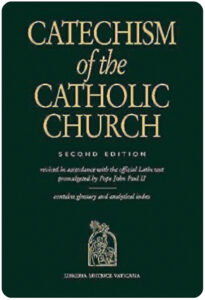 he best Catholic commentary about Scripture
he best Catholic commentary about Scripture
To find out more about how Church teaching is supported by Scripture passages in You Shall Have No Other Gods: The Book of Exodus, check out the Index of Citations in the Catechism of the Catholic Church. Links (Revised Standard Version Catholic Edition [RSVCE*]) to the primary Scripture passages in the lesson and relevant paragraphs in the Catechism are provided here. Not every passage in the biblical text for this Catholic study is referenced in a Catechism paragraph, however.
the book of Exodus 32:1–35—paragraph 2575
the book of Exodus 32:1—34:9—paragraph 2777
the book of Exodus 32:15—paragraph 208
ways our glossary might prove helpful
In addition to providing extra information about geographical locations, our glossary also points out  when a person or place is mentioned in the biblical text under more than one name or more than one spelling. If you can remember a name but aren’t sure in which lesson it shows up, you can find it in the glossary, which lists every proper noun that appears in the biblical text for every lesson in You Shall Have No Other Gods: The Book of Exodus.
when a person or place is mentioned in the biblical text under more than one name or more than one spelling. If you can remember a name but aren’t sure in which lesson it shows up, you can find it in the glossary, which lists every proper noun that appears in the biblical text for every lesson in You Shall Have No Other Gods: The Book of Exodus.
to learn more, read more Scripture
If you’re having difficulty with a particular passage of Scripture, it can be helpful to read the relevant  cross references—but looking these up can take time. To make that easier, we’ve compiled the cross references from the Revised Standard Version Second Catholic Edition (RSV2CE)—the translation that we reprint in our study books. That list can be found at the top of every online study page accompanying this study, and it includes links to each of the cross references in the primary biblical text for You Shall Have No Other Gods: The Book of Exodus.
cross references—but looking these up can take time. To make that easier, we’ve compiled the cross references from the Revised Standard Version Second Catholic Edition (RSV2CE)—the translation that we reprint in our study books. That list can be found at the top of every online study page accompanying this study, and it includes links to each of the cross references in the primary biblical text for You Shall Have No Other Gods: The Book of Exodus.
don’t forget about our indexes & extra online material

 If you’re trying to locate information about a specific Scripture passage, you can look it up in the index at the back of the study book or sample lesson. If you want to find a particular commentary, you can look up its title in the topics index. To learn more about another book of the Bible for which there’s a Turning to God’s Word study, visit the online study directories to read the commentaries and watch any accompanying videos. Finally, if you have a question or would like to make a comment about any of our studies, you can use one of the “ask us your question” or “what do you think” buttons to email our authors.
If you’re trying to locate information about a specific Scripture passage, you can look it up in the index at the back of the study book or sample lesson. If you want to find a particular commentary, you can look up its title in the topics index. To learn more about another book of the Bible for which there’s a Turning to God’s Word study, visit the online study directories to read the commentaries and watch any accompanying videos. Finally, if you have a question or would like to make a comment about any of our studies, you can use one of the “ask us your question” or “what do you think” buttons to email our authors.
ex libris—Church documents & books about religious topics
Link to magisterial documents referred to in our Bible studies at ex libris—magisterial documents.  This listing includes significant recent encyclicals as well as a number of historical Church documents. Recommended books related to Scripture study can be found at ex libris—main bookshelf.
This listing includes significant recent encyclicals as well as a number of historical Church documents. Recommended books related to Scripture study can be found at ex libris—main bookshelf.
wondering how to pronounce some of these words?
The following link is to a reading from the New International Version (NIV) Bible. To listen, open the link and click on the audio icon above the printed text. Although not taken from the translations used in our study materials, the NIV reading provides an audio guide to pronunciation of words in this lesson’s primary biblical text. A close online version of the translation of the Bible used in Catholic liturgy in the United States as well as an audio guide for daily Mass readings for the current month can be found on the website of the United States Conference of Catholic Bishops (USCCB).
the book of Exodus 32:1–35 (NIV)
 close with Bible-based prayer related to this lesson
close with Bible-based prayer related to this lesson
Many of our Catholic study groups like to conclude their discussions with a prayer based on the scriptural focus of their lesson, and some participants include Scripture-specific prayer in their individual study. If you’re uncomfortable composing your own Bible-based prayers, you can follow our four easy steps. If you prefer, you can use the following short prayer based on this lesson’s text from the book of Exodus.
O God, your mercy extends to all generations.
Help us to avoid the sin of worshiping anything other than you,
and enable us to bear responsibility for our sins
and to the accept that even the most minor sin has consequences.
Grant us proper gratitude for your forgiveness.
We ask this in the name of Jesus Christ,
who offered his life to bring about the possibility of our salvation. Amen.
Lesson 25 Despite the People’s Sin, the LORD Renews His Covenant, the book of Exodus 33:1—35:3
Lesson 23 Worship Instructions; God Chooses His Artisans, the book of Exodus 30:1—31:18
you also may like our study of the book of Genesis
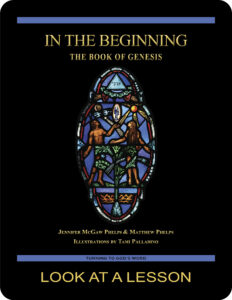 The first seven lessons of In the Beginning: The Book of Genesis, a 28-lesson Catholic Bible study with an imprimatur, provide an in-depth look at the very earliest biblical history—including the two accounts of Creation, events surrounding the Fall of Adam and Eve, the relationship between Cain and Abel, and the baptismal foreshadowing present in the account of Noah and the Flood. Remaining lessons look at lives of the patriarchs Abraham, Isaac, Jacob, and Joseph. Click on the book’s cover to view a sample lesson.
The first seven lessons of In the Beginning: The Book of Genesis, a 28-lesson Catholic Bible study with an imprimatur, provide an in-depth look at the very earliest biblical history—including the two accounts of Creation, events surrounding the Fall of Adam and Eve, the relationship between Cain and Abel, and the baptismal foreshadowing present in the account of Noah and the Flood. Remaining lessons look at lives of the patriarchs Abraham, Isaac, Jacob, and Joseph. Click on the book’s cover to view a sample lesson.
start a Turning to God’s Word Bible study
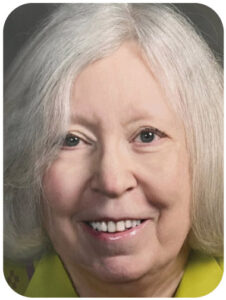 Thank you for your interest in You Shall Have No Other Gods: The Book of Exodus.
Thank you for your interest in You Shall Have No Other Gods: The Book of Exodus.  Information about beginning a Turning to God’s Word Bible study can be found at start a Bible study. Tami, Matthew, and I are available to answer your questions and to offer support. You may use this email to contact us directly if you’re interested in starting a Turning to God study or in having your study schedule listed with other TtGW study groups on our website. —Jennifer
Information about beginning a Turning to God’s Word Bible study can be found at start a Bible study. Tami, Matthew, and I are available to answer your questions and to offer support. You may use this email to contact us directly if you’re interested in starting a Turning to God study or in having your study schedule listed with other TtGW study groups on our website. —Jennifer
*There are seven deuterocanonical books in the Old Testament—the Books of Tobit, Judith, Wisdom, Sirach, Baruch, and First and Second Maccabees, as well as some passages in the Books of Esther and Daniel. Protestants usually refer to these works as “apocryphal,” a word that means “outside the (Protestant) canon” because they’re excluded from most Protestant Bibles. The word “deuterocanonical” means “second canon”; Catholics use that word to refer to any section of the Catholic Old Testament for which there are no extant, or existing, Hebrew manuscripts. All of the deuterocanonical books appear in the Septuagint, the earliest remaining versions of which date to the 1st century B.C. This Greek translation of the Old Testament was in common use by Jews at the time of Jesus—but the same books aren’t found in existing Hebrew manuscripts, which aren’t as old as the oldest version of the Septuagint. Learn more by reading How Do Catholic & Protestant Bibles Differ?
Turning to God’s Word printed Bible studies use the 2006 Revised Standard Version Second Catholic Edition (RSV2CE) translation for all Scripture references except those to the Psalms, which are taken from The Abbey Psalms and Canticles, prepared by the Benedictine monks of Conception Abbey and published in 2020 by the United States Conference of Catholic Bishops (USCCB). All Scripture links for the online study pages for You Shall Have No Other Gods: The Book of Exodus are to the 1966 Revised Standard Version Catholic Edition (RSVCE) translation. The New International Version (NIV) audio recordings follow the same chapter and verse numbering as the RSV Catholic translations, but the NIV translation doesn’t include the deuterocanonical books and passages.
The 1966 RSVCE uses archaic pronouns and verb forms such as “thee,” “thou,” “didst” in the Psalms and in direct quotations attributed to God. The 2006 RSV2CE replaces those with more accessible English. The few significant translation changes in the RSV2CE include rendering almah as “virgin” in the Book of Isaiah 7:14 and restoring the term “begotten” in the Gospel According to John 3:16.
Numbering varies for some passages in this Bible study. Turning to God’s Word studies (print and digital) follow the numbering in the Revised Standard Version Catholic translations (RSV2CE and RSVCE). Discrepancies in the New American Bible Revised Edition (NABRE) are noted in the Index of Scripture Citations in the study book and the online sample.
 You can learn more about the Psalms by viewing a sample lesson from the Turning to God’s Word Catholic Bible study Sing a New Psalm: Communicating with God Through the Prayers of the Church—Volume I: Lauds & Vespers. The second part of that study, Sing a New Psalm: Communicating with God Through the Prayers of the Church—Volume II: Vigils, Day Prayer & Compline, is scheduled for publication in 2025. Some verse numbers may vary in different translations of the Psalms.
You can learn more about the Psalms by viewing a sample lesson from the Turning to God’s Word Catholic Bible study Sing a New Psalm: Communicating with God Through the Prayers of the Church—Volume I: Lauds & Vespers. The second part of that study, Sing a New Psalm: Communicating with God Through the Prayers of the Church—Volume II: Vigils, Day Prayer & Compline, is scheduled for publication in 2025. Some verse numbers may vary in different translations of the Psalms.
